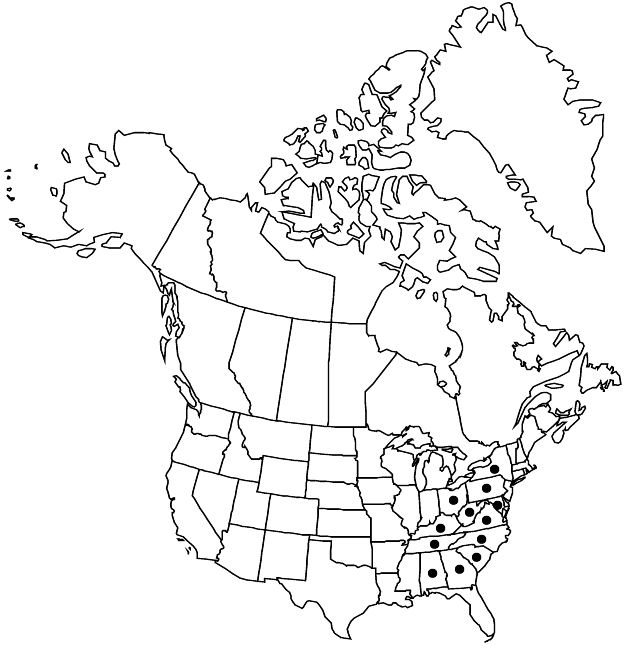Viola hastata
Fl. Bor.-Amer. 2: 149. 1803.
Plants perennial, caulescent, not stoloniferous, 5–30 cm. Stems 1 (–2), erect, leafless proximally, leafy distally, glabrous or sparsely puberulent, from fleshy rhizome. Leaves basal and cauline; basal: 0–1; stipules ovate to lanceolate, margins laciniate with gland-tipped projections, apex usually acuminate; petiole 3–11.5 cm, usually glabrous; blade sometimes gray-green abaxially, usually mottled light green adaxially, widely or narrowly hastate to ovate, 2.5–4.4 × 1.8–3.2 cm, base hastate to cordate or truncate, margins serrate or crenate, ciliate or eciliate, apex acute, surfaces usually glabrous, sometimes scabrous; cauline similar to basal except: leaves usually restricted to distal ends of naked stems; petiole 1–2.5 cm; blade 2–10 × 1.1–4.5 cm. Peduncles 1–5.3 cm, usually glabrous. Flowers: sepals lanceolate to ovate, margins mostly eciliate, auricles 0.5–1 mm; petals lemon-yellow usually on both surfaces, lower 3 and sometimes upper 2 brownish purple-veined, lateral 2 bearded, lowest 9.5–12 mm, spur yellow to greenish, gibbous, 0.5–2 mm; style head bearded; cleistogamous flowers axillary. Capsules ovoid to ellipsoid, 6–8 mm, glabrous. Seeds beige to bronze, 2–2.5 mm. 2n = 12.
Phenology: Flowering late Mar–May.
Habitat: Rich woods, chiefly mountains and piedmont
Elevation: 50–2000 m
Distribution

Ala., Ga., Ky., Md., N.Y., N.C., Ohio, Pa., S.C., Tenn., Va., W.Va.
Discussion
V. B. Baird (1942) commented that Viola hastata is more closely related to V. glabella than to any eastern species.
Selected References
None.
Lower Taxa
"thick" is not a number. "narrow" is not a number.